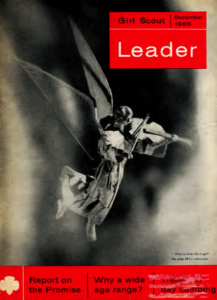
Delegates in the Council
Participation in council government can be an exciting and rewarding experience
To be a council delegate can be a challenging and exciting experience. Whether this is your first or your tenth council meeting, attending as a delegate should prove rewarding to you as an individual and productive for the council. It is at such meetings that group spirit is renewed and fresh enthusiasm gained for the task ahead. Council meetings are important events in the continuing life of a Girl Scout council. It is then that decisions are made, officers and board members elected, and lines of direction given to the council’s board of directors.
What are the duties of a delegate? Stated in simplest terms, they are:
- To attend regular meetings of the council and to participate in the proceedings.
- To be informed on the needs and point of view of the local association (neighborhood, community, etc.).
- To vote “in meeting assembled” and on the basis of what is in the best interests of Girl Scouting.
- To report to the local association (neighborhood, community, etc.) on the decisions reached and the reasons therefor.
In reviewing these duties in detail, a threefold responsibility emerges for each delegate –
- Before the meeting, preparation.
- During the meeting, participation.
- After the meeting, communication.
Preparation before the meeting involves:
- becoming thoroughly informed about the local association and its needs, point of view, and problems, if any;
- reviewing and studying the meeting workbook and the agenda and attachments in detail;
- having pertinent facts at hand;
- knowing about the nominees for election;
- practicing skills of participation (reporting, parliamentary procedure, discussion, etc.)
Participation at or during the meeting involves:
- listening carefully, weighing judiciously, and deciding prudently;
- voting on the basis of intelligent analysis of facts;
- acting wisely in making decisions that will be in the best interests of Girl Scouting.
Communication after the meeting involves:
- reporting on official action and the reasons therefor (discussions pro and con and decisions voted upon);
- reporting the elected slate of officers and board members;
- informing and interpreting new items or issues presented at the meeting (for study or follow-up);
- evaluating with other delegates and responsible groups and individuals in the council on ideas, issues, and new agenda items for future council meetings.
To come together as delegates “in meeting assembled” and to participate in what is essentially a collective enterprise can be an opportunity for productive action on the part of every delegate. The wisdom of the decisions made, the nature of the problems solved, and the clarity of the direction set will depend in large part upon the effective participation of the individuals carrying this elected responsibility.
Why is it important that delegates come to the meeting informed but not instructed? A council meeting is a deliberative body and has a specific purpose: therefore, delegates carry out their respective responsibilities “in meeting assembled” and not on a one-to-one basis. Each individual exercises self-discipline in order to insure the true spirit of a democratic meeting. Provisions should be made in the meeting plan for the debate and discussions of all issues in a free and open manner. Various points of view may be expressed on the floor, and delegates carry an obligation to make the local association’s point of view known. On the other hand, delegates also have the obligation to listen to other ideas and recommendations, and to weigh the pros and cons of the argument judiciously. When the time comes for a vote, a delegate acts upon her own individual convictions and in what she considers the best interests of Girl Scouting.
Belief in majority rule is inherent in democracy. The diverse views in any group can be brought to an issue by orderly discussion and clearly defined debate. When the decision has been made by majority vote, the responsibility of every delegate is to support that decision wholeheartedly and to participate in its implementation. Thus direction is set for the council’s future, and continuity of effort is assured. You – as a delegate – help to do this for your council and for Girl Scouting. It is an honor and a privilege; cherish it well.
